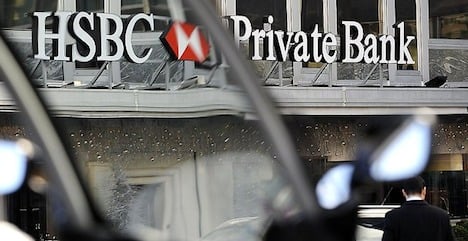Earnings after tax climbed to $5.26 billion in the three months to the end of March, compared with $5.21 billion a year earlier, the Asia-focused bank reported in a results statement.
Pretax profits advanced 4.4 percent to $7.1 billion in the same period.
That sent HSBC's share price racing higher in morning trading because it easily beat market expectations of $5.8 billion.
"Our business recovered well in the first quarter following a difficult fourth quarter," said chief executive Stuart Gulliver in the statement.
"Global Banking & Markets had its usual strong start to the year, with a notable increase in year-on-year revenue in our markets businesses."
However, striking a negative tone, the bank also disclosed a new twist in the so-called SwissLeaks scandal.
"In the UK, the Financial Conduct Authority (FCA) issued a request for information to HSBC Bank plc and HSBC Holdings plc in relation to HSBC Swiss Private Bank," the bank announced in the earnings release.
The FCA had previously said in February that it was "working closely with the firm".
A request for information by the watchdog however falls short of launching a formal investigation.
During the quarter, HSBC was forced to apologize for "unacceptable" failings at its Swiss division following allegations that the unit helped rich clients hide billions from the taxman.
HSBC has faced a storm over claims that it helped clients from around the world dodge taxes on accounts containing €180 billion ($204 billion) between November 2006 and March 2007, in cases that are being investigated in several countries.
The Asia-focused lender had already revealed last month that it was facing a French criminal probe over the affair.
Separately, HSBC was fined late last year by US and British regulators for attempting to rig foreign exchange markets.
Headquarters uncertainty
Tuesday's results meanwhile came little over one week after HSBC launched a review on whether to remain headquartered in Britain as the country increases regulation and taxation of the sector.
The group highlighted its concern about government policy to ring-fence British banks' retail operations to protect them from their investment divisions.
HSBC has been hit particularly hard by the British government's banking sector levy, which last year cost it $1.1 billion, up from just $200 million in 2013. The levy — imposed on lenders' balance sheets — was hiked again in
April.
"One of the factors that we will be clearly looking at in terms of where we headquarter the company is the size of the levy," Gulliver told a conference call amid suggestions it could relocate to Hong Kong.
After rallying in early deals following the better-than-expected results, shares in HSBC slumped to 629.60 pence in London, down 2.58 percent since the previous close.
Spreadex analyst Connor Campbell said "a lack of news on its relocation tempered the buzz around HSBC", as did the bank's claim that the levy would weigh on dividend payouts.
HSBC, founded in Hong Kong and Shanghai in 1865, employs 48,000 across Britain with around 8,500 staff based at its London headquarters.
It has been based in Britain since 1992 when it took over Midland Bank and shifted its headquarters to London.



 Please whitelist us to continue reading.
Please whitelist us to continue reading.
Member comments